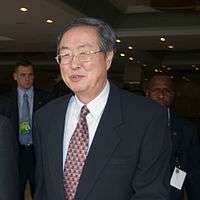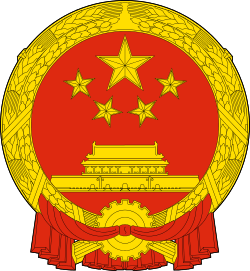Zhou Xiaochuan
| Zhou Xiaochuan | |
|---|---|
| 周小川 | |
 | |
| 11th Governor of the People's Bank of China | |
|
Assumed office December 2002 | |
| Premier |
Wen Jiabao Li Keqiang |
| Preceded by | Dai Xianglong |
| Personal details | |
| Born |
January 29, 1948 Yixing, Jiangsu |
| Nationality | Chinese |
| Political party | Communist Party of China |
| Spouse(s) | Li Ling[1] |
| Alma mater |
Beijing Institute of Chemical Technology Tsinghua University |
| Signature |
 |
Zhou Xiaochuan (Chinese: 周小川; pinyin: Zhōu Xiǎochuān) (born January 29, 1948) is a Chinese economist, banker, reformist and bureaucrat. As governor of the People's Bank of China since December 2002, he has been in charge of the monetary policy of the People's Republic of China. He was reappointed to the same position in March 2013, making him the longest-serving central bank chief since the establishment of the People's Republic of China.[2]
He has previous held leading posts in trade and finance organizations such as Vice-Governor of the People's Bank of China, Director of the State Administration of Foreign Exchange, Governor of China Construction Bank, and Chairman of the China Securities Regulatory Commission. Zhou is associated with Jiang Zeming and the Shanghai clique of politicians.
Zhou is one of the most influential economic figures in the world and was ranked 4th by Foreign Policy in the Top 100 Global Thinkers report of December 2010.[3] In both 2011 and 2012, he was included in the 50 Most Influential ranking of Bloomberg Markets Magazine.
Early life
Born in Yixing, Jiangsu province, he was the son of Zhou Jiannan and Yang Weizhe (杨维哲). The elder Zhou was the head of Electric and Industrial Bureau of the North East district in 1949. He later became Vice Minister of First Department of Machinery Development in 1961. During the Cultural Revolution, Zhou Xiaochuan joined a Production and Construction Corps in Hei Long Jiang province while his father was persecuted. The family's fate changed when the elder Zhou returned to power, in 1973.
Education
Zhou Xiaochuan graduated from Beijing Institute of Chemical Technology (now Beijing University of Chemical Technology) in 1975 and received a PhD degree in Automation and System Engineering from Tsinghua University in 1985.[4]
Family
He was the second son of Zhou Jiannan, an early member of Chinese Communist Party and its secret service. The eldee Zhou was the head of Electric and Industrial Bureau of the North East district in 1949 and Vice Minister of the First Department of Machinery Development in 1961. After the Cultural Revolution, the father served as Minister of Machine Industry, Vice Chairman of National Commission of Import and Export, and adviser to the Commission of Financial and Economic Affairs.
Zhou's father was also one of the promoters of Jiang Zemin in his early career was and said to be one of Jiang's mentors.
The son is married to Li Ling, who runs the Treaty and Laws department of the Ministry of Commerce of the People's Republic of China, which has played a central role in handling China's trade disputes with the United States under the World Trade Organization. Forbes referred to Zhou and Li as a "Chinese power couple that the Obama administration has to watch out for in the coming years, as the U.S. tries to defend its position in the world economic pecking order."[1]
Career
During the early days of the Cultural Revolution, he worked at a Production and Construction Corps in Heilongjiang province from 1968 to 1972. He was sent to the Beijing Institute of Chemical Technology as a Gong Nong Bin Student (students selected from workers, farmers and military, a common practice of college admissions in the Cultural Revolution) in 1972. After graduating from college in 1976, he was assigned to Beijing Research Center of Automation as an engineer studying large automation systems.
Between 1978 and 1985, he was studying for master's degree in Industrial Application of System Engineering in China Academy of Machinery Science and Technology and Ph.D in Science in Tsinghua University.
In 1986, he started working in the State Council of the People's Republic of China on economic restructuring as a member of the Economic Policy Group of the State Council and Deputy Director of the Institute of Chinese Economic Reform Research. He served as Assistant Minister of Foreign Trade from 1986 to 1989 and between 1986 and 1991, he was also a member of the National Committee of Economic Reform. Before the Tiananmen Square protests of 1989, Zhou was an associate and protégé of Zhao Ziyang.
Between 1991 and 1995, he was executive director and vice president of Bank of China. From 1995, he assumed the position of Administrator of State Administration of Foreign Exchange. From 1996 to 1998, he served both as Deputy Governor of the People's Bank of China and Administrator of the State Administration of Foreign Exchange.[5]
During 1998 to 2000, he served as president of the China Construction Bank[5] and oversaw the creation of asset-management companies charged with working out the banking system's bad debt. He also played a part in managing China's vast foreign exchange reserves.
From 2000 to 2002, Zhou was the chairman of the China Securities Regulatory Commission. Whilst there, he earned the nickname Zhou "Bapi" (周扒皮), Zhou "the flayer". He targeted corruption in listed companies, angering many small shareholders, who saw their shares fall. In July 2001, Zhou declared his intention to reduce state ownership in the stock market. The stockmarket quickly went into freefall, forcing him to abandon his plans that October. He emphasized the role of market mechanisms, worked to reduce red tape and aimed to protect retail investors.[6]
People's Bank of China
In December 2002, he was appointed to his present position as governor of the People's Bank of China and also took over the position of chairman of monetary policy committee of the People's Bank of China from January 2003.[5] In 2010, he was serving his second five-year term.[6]
As leading banking authority, Zhou is in charge of clearing up some $865 billion of bad loans in the Chinese banking system. He is been under pressure from the finance ministers and central bankers of the G7 countries to revalue the renminbi and change its mechanism of setting exchange rate.
Zhou has published a dozen monographs and over one hundred academic articles in Chinese and international journals. His articles "Rebuilding the Relationship between the Enterprise and the Bank" and "Social Security: Reform and Policy Recommendations" and his book Marching toward an Open Economic System have all won awards in China.
He is generally considered the most academically capable of the current Chinese leadership and is praised for his intellect and diplomacy. He has been called "China's most able technocrat" and is the only highly ranked Chinese politician to have been published in a Western academic journal. Although he has yet to reach the highest rungs of decisionmaking within the State Council, he is considered a strong and vocal advocate of further liberalization in the financial sector. He has increasingly displayed an openness to the press, rare for a senior Chinese official, and is most famous for this motto: "If the market can solve the problem, let the market do it. I am just a referee. I am neither a sportsman nor a coach."
His career has been devoted to economic reform. To that end, Zhou has had a preference for recruiting overseas educated and trained Chinese (locally called "sea turtles"), who have experience of capitalist markets.
Zhou had been suggested as a future premier, but some consider that he did not have the political experience. On January 15, 2006, however, the Financial Times of London called him "a rising political star and widely expected to be promoted to vice-premier in the next major reshuffle of top party and government posts, due in late 2007 and early 2008." That did not materialise, however, with the post instead going to Li Keqiang.
International monetary system reform
On March 24, 2009, Zhou gave a speech, "Reform the International Monetary System". He argued that the ongoing financial crisis was made more severe by inherent weaknesses of the current international monetary system and called for a gradual move towards using IMF special drawing rights (SDRs) as a centrally managed global reserve currency. He argued that it would address the inadequacies of using a national currency as a global reserve currency, particularly the Triffin dilemma, the dilemma faced by issuing countries in trying to simultaneously achieve their domestic monetary policy goals and meet other countries' demand for reserve currency. Zhou explained global currency diversification was needed because an overconcentration of foreign assets denominated in the dollar may bring about undesired consequences. Zhou argued that it was regrettable that John Maynard Keynes's "farsighted" bancor proposal was not adopted at Bretton Woods in the 1940s.[7][8]
Zhou also asserted China's increasing confidence in its own financial governance philosophies. He criticized Western leaders for letting their banking sectors go astray by loose regulations.[9]
Third term
In March 2013, Zhou was reappointed as the governor of People's Bank of China, making him the longest-serving central bank chief since the establishment of the People's Republic of China. His reappointment came as "China's newly installed political chiefs - headed by Communist Party general secretary Xi Jinping and Premier Li Keqiang... [and was] seen as a bid to burnish the [new leaders'] pro-reform credentials". Earlier in Zhou's career, "as a protege of former Premier Zhu Rongji, [Zhou] helped draw up the blueprint to wean the economy off central planning."[2]
During a March 5, 2013 meeting of the National People’s Congress and the Chinese People's Political Consultative Conference, Zhou announced the People's Bank of China would deal with the "ramifications of the excessive money supply and will gradually control the new money supply" because of the 2008 fourth quarter financial crisis.[10]
In September 2015, Zhou addressed the G-20 finance meeting in Ankara about the sharp, sustained drop in the Chinese stock market in 2015 and said that the "correction in the stock market is almost done."[11]
References
- 1 2 Wang, Tina (April 30, 2009). "China's New Power Couple". Forbes.
- 1 2 Yao, Kevin (2013-03-16). "NEWSMAKER-China c.bank head to spur reforms through tough waters". Reuters.
- ↑ The FP Top 100 Global Thinkers
- ↑ Zhou Xiaochuan 周小川, chinavitae.com. Retrieved 2015-12-19.
- 1 2 3 "biography: Zhou Xiaochuan". The People's Bank of China.
- 1 2 Blanchard, Ben (2010-08-24). "PROFILE-China's central bank governor Zhou Xiaochuan". Reuters.
- ↑ Zhou Xiaochuan. "Reform the International Monetary System" (PDF). Bank for International Settlements. Retrieved 2010-01-11.
- ↑ Anderlini, Jaimi, "China calls for new reserve currency", Financial Times, March 23, 2009. Retrieved 2015-12-19.
- ↑ The Economist: China Takes Centre Stage
- ↑ Chen, Xiaoyi (5 March 2013). "PBoC President: 2013 M2 growth expected 13 percent". The Morning Whistle. Retrieved 2 April 2013.
- ↑ Wei, Lingling, "China’s Central Bank Chief Predicts End Nigh for Market Rout" (possibly subscription only), Wall Street Journal, September 6, 2015. Retrieved 2015-09-06.
External links
| Wikimedia Commons has media related to Zhou Xiaochuan. |
- (Chinese) Biography of Zhou Xiaochuan, Xinhuanet.
| Government offices | ||
|---|---|---|
| Preceded by Dai Xianglong |
Governor of the People's Bank of China 2003–present |
Succeeded by Incumbent |
